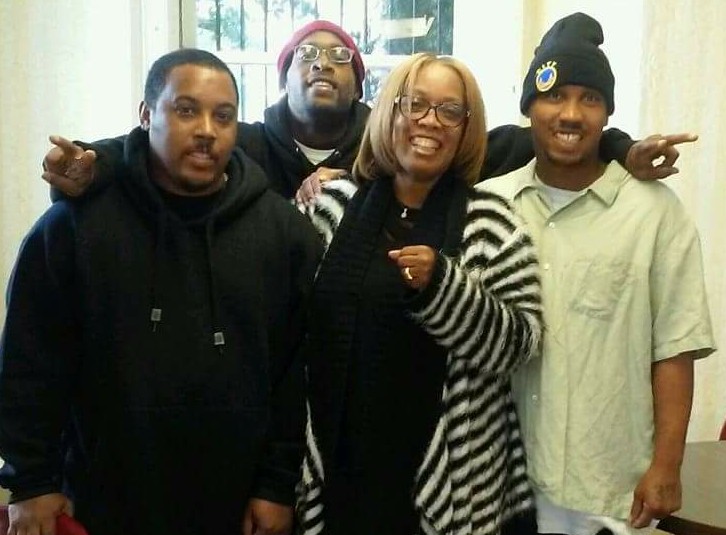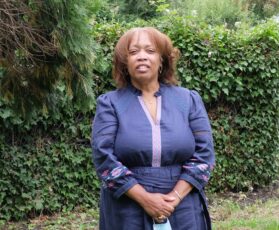
Photo: Mario Woods (far right) with his mother Gwendolyn Woods and brothers Monroe Whitt and Michael Woods Jr.
Interview with Gwendolyn Woods
In 2015, 26-year-old Mario Woods was shot over 20 times by San Francisco police officers, despite cell phone videos appearing to show that they were not in imminent danger at the time. He had a butter knife at his side pointed down. His death sparked widespread protests and prompted a federal investigation and ultimately resulted in the resignation of then-San Francisco police chief Greg Suhr.
Mario was shot and killed by San Francisco police officers Charles August, Winson Seto, Antonio Santos, Nicholas Cuevas and Scott Phillips in 2015. Then-San Francisco District Attorney George Gascón declined to criminally charge the officers. The San Francisco Board of Supervisors declared Mario Woods Remembrance Day to take place every year on July 22nd, Mario’s birthday.
Mario is survived by his two brothers, Monroe Whitt and Michael Woods Jr., and Gwendolyn Woods, his mother, who has relentlessly fought for justice for her son.
The following is an edited excerpt from a longer interview with Gwendolyn Woods:
______
Mario was quiet, very unassuming. You probably wouldn’t even notice he was in the room. He had this kind of dry sense of humor. And he was just an old soul to me.
He would bring friends home that didn’t have anything to eat at their moms’. I remember buying him and his brother their winter coats. I said, where’s that coat I brought you? And he said, I had to give it to my buddy cause he didn’t have a coat mom. And we can get a coat. And so he was that. He just had this beautiful heart. I cannot describe his heart. It was so beautiful.
“He just had this beautiful heart. I cannot describe his heart. It was so beautiful.”
Mario was the one that, he was going to make life right for me. That was his thing. I always think we had in common, he was the youngest. I was the youngest. I think a lot of times he went under the radar, like I did. I was responsible for a lot of things, being the youngest. And I worried a lot more than my other siblings about my mother. Mario was like that for me. He never forgot Mother’s Day cards. Those things.
I can say Mario was my ride or die. He really was.
His issues were no different than anybody else’s issues. And I had taught him how to drive. And every time he accomplished something, his first bank card and how to use the ATM and how to deposit, all these things, I saw him believe more in himself. And I remember saying, you’re going to have some down days, but we’re going to get right back up. And as long as we’re together, we’re good.

And I remember telling Mario one time, I said, laugh out loud more because he hardly would laugh. He had this kind of nervous, goofy laugh. I hear it in my head, and I realize I was saying it more for me than him. The way he would always just say, Mom, Mom, Mom, always needed something. Mom, mom. I miss that. I miss that.
He just got a raw deal that day. It was so, so wrong what they did to Mario.
He was a little, I think that day I didn’t read much into, he might’ve been a little, a lot depressed. He did give me a call. And he was a little bit, I don’t know, a little bit down about seeing the parole officer. And I was a little bit firm with him, like just call the parole officer and do it, and then I’ll see you tonight. And kind of hung up abruptly.
And so as the day goes by, I see a friend Kelvin Brooks who lived in our community. And we’re friends on Facebook. And he posts something, does anyone know about the man that was just killed in the Bayview?
And then Kelvin has this image posted. And I know his walk, pigeon-toed. And I quickly shut it off.
And I call my niece.
I said, I’m gonna send you this Facebook page image. I want you to tell me, is that Mario in that image? (whispers) And it was Mar. She was like, that’s my cousin.
And, you know, you don’t want to admit it subconsciously. You can’t accept that. But I knew his little walk. And I think from that day I’ve been trying to put it all back together, trying to make sense of it. I can’t. I can’t.
And our life is now forever changed. When I think about the pain, I remember carrying Mario. I remember the labor pains. And I remember the sound of his heartbeat and him swimming in the sack and on that machine. And it seems like the pain comes in like that. With the labor, it starts up and it like goes up and up. And you can just see it. And you have to ride it out.
I do say, I’d rather stay angry and mad because that keeps you in the fight of it. To me, it keeps you alive. The grief takes you out. You can’t move on it. You can’t function. You’re dormant with it.
And now I’m starting to finally maybe grieve this. And it’s horrible, you know, because there’s so many triggers with it, that comes with it.
For us, as parents that lost our loved ones to police state, policing brutality, and to see it videotaped because it’s ever going to be an image scarred in your mind, you can never shake it. But you see your child. You just triggered. You’re back there. I’m back in 2015. It’s December 2nd, 4:44 PM when this happened to Mar. And so you’re in that moment.
And as a mother, I think it’s all I can do for him. It’s like when they’re little, the things you do, tuck them in, all these things you do, brush their little hair. All I can do for him now is tell everybody who he was.
______
This story is part of the series TAKEN FROM US: Remembering lives lost to police violence.
This piece was reported and produced by Lucy Kang.
First aired on UpFront on July 22, 2020.

